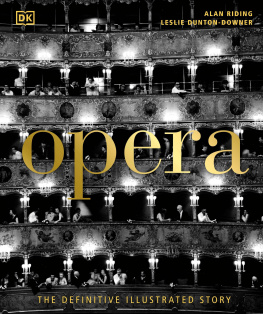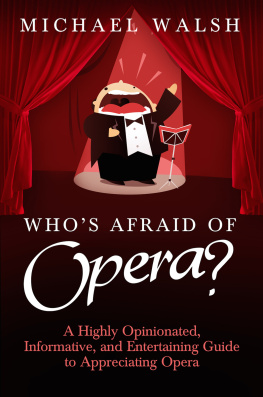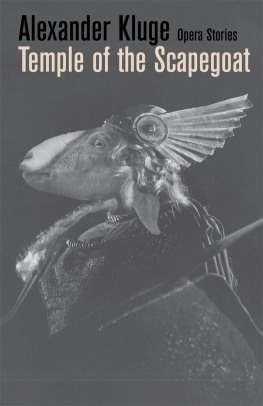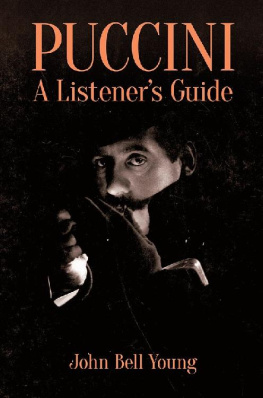A Perigee Book
Published by The Berkley Publishing Group,
A division of Penguin Putnam Inc.
375 Hudson Street
New York, New York 10014
PRODUCED BY GRAND CENTRAL PRESS
Paul Fargis, Director
Judy Pray, Executive Editor
Nick Viorst, Series Editor
NATIONAL PUBLIC RADIO
Murray Horwitz, Vice-President, Cultural Programming
Andy Trudeau, Executive Producer, Cultural Programming
Bruce Scott, Music Producer (Opera), Cultural Programming
Barbara A. Vierow, Project Manager, Business Development
Kate Elliott, Project Manager, Business Development
NPR, npr, and National Public Radio are service marks of National Public Radio, Inc. and may not be used without the permission of NPR.
Copyright 2002 by Grand Central Press and National Public Radio
Book design by Tiffany Kukec
Cover design by Jill Boltin
Cover art by Dan Baxter
All rights reserved. This book, or parts thereof, may not be reproduced in any form without permission.
Visit our website at www.penguinputnam.com
ISBN 978-1-1012-2117-4
Without limiting the rights under copyright reserved above, no part of this publication may be reproduced, stored in or introduced into a retrieval system, or transmitted, in any form, or by any means (electronic, mechanical, photocopying, recording, or otherwise), without the prior written permission of both the copyright owner and the above publisher of this book.
Making or distributing electronic copies of this book constitutes copyright infringement and could subject the infringer to criminal and civil liability.
First edition (electronic): April 2002
T he author is deeply indebted to a large number of people, both professional and amateur, whose generosity in sharing their knowledge, insight, and passion for opera has made this project possible. Also, I am grateful to friends and colleagues who have been equally generous with time and support. Among both these groups are some who must be thanked by name: Adam Abramowitz, Frances Berger, Aronnora Morgan, Rich Lynn, Lou Ruffalo, Martin Majchrowicz, Al Zuckerman, Bruce Scott, Lou Santacroce, Mark Mobley, Anya Grundmann, Stephen Miller, and a special thanks to Nick Viorst for his tireless commitment to this project.
by Plcido Domingo
M usic is both my work and my hobby. Sharing it with others is my passion. And introducing more people to the marvelous, vivid world of opera has been a long-standing dream of minefrom both sides of the stage. On the performing side, developing the next generation of talent has led to our worldwide Operalia competition for young singers, and to the Young Artists Training Program weve established at the Washington Opera. To my mind, programs like these are vital to making sure this artform flourishes in the twenty-first century.
But what of the audiences that will hear these great young artists? There is marvelous talent in our concert halls and opera houses. But something as important and beautiful and timeless as opera should not be only for specialists! It should be for everybodya cornerstone of musical knowledge and basic education.
But Im constantly surprised and disappointed that there is not more music education in our schools. There are simply too many missing pages in our young peoples knowledge of music. Those blank pages have been filled in by the pervasive beat of pop music, pushing nearly everything else aside. And that is a shame, because opera is so approachable. We simply need to give everyone the opportunity to learn it. Im convinced that if I take two of my young artists into a school for a week and they teach kids to sing a beautiful, simple aria like La ci darem la mano from Mozarts Don Giovanni, Im on the way to making some opera fans for life.
Musical education, of course, isnt just for schoolchildren. And thats why Im delighted that NPR has published this book. Its clever and concise, entertaining and educational. Whether the world of opera is a new discovery or an old friend, this NPR Guide is a marvelous way to fill in any of your own missing pages. And maybe make YOU a lifetime fan.
A ny American who first approaches the world of opera today would be in the position of a newcomer approaching baseball. The two institutions, after all, have quite a bit in common. Both opera and baseball claim legions of insanely loyal fans who believe the subjects of their passion to be uniquely eloquent, powerful, and even spiritual in some sense. They are also both equally mystifying to those who are not fans, people who cannot grasp what all the fuss is about and who suspect the fans to be delusional in their passion. Both opera and baseball receive the same criticisms from detractors. Both are called slow, plodding, old-fashioned, and hopelessly out of touch with todays fast-paced world and its less genteel modes of expression. Many true athletes decry baseballs lack of pure athleticism and many true musicians denounce operas impure musicality. Both opera and baseball are imbued with rituals and postures that apparently have nothing to do with the supposed tasks at hand, yet that are, inexplicably, accepted and even celebrated by their respective devotees. Both thrive on mythic elements from the past, and both have always been said to be in a state of decline today compared to the Golden Ages (real or imagined), of yesterday.
The simile can be stretched further. Even those who have no interest in baseball or opera accept the fact that an American city must have a baseball stadium and an opera house if it is to be considered a major urban center. In this way, these venues fulfill a function not unlike cathedrals in medieval French towns, except that most residents of the modern American city never actually enter these cathedrals. Still, they are happy to know that such places exist, and cheerfully accept the status they confer on their hometowns. They might even get curious to know what goes on in these places. Here the newcomers to baseball and opera find themselves in very analogous situations. Asking fans about their passions is hazardous. First, one must endure a long discourse on the beauty of the pastime in question. Then, assuming the newcomer has the fearlessness to pursue the discussion on to the detail level, he or she is flooded by a completely incomprehensible jargon that has no apparent relationship to any other sport or art form. More confused than before, the newcomer can be excused for dismissing the whole subject as irrelevant to his or her own life.
All this is true for both baseball and opera, but it must be admitted that opera has its own unique barriers in addition to those already mentioned. While opera is a palpable and growing presence in America, no one outside of the asylums would (yet) call it The American Pastime. Although a distinctly European art form in origin, opera belongs to the world at this point in history. The notion that opera is not exclusively American permits some to perceive it as distinctly un-American. There are language issues beyond the jargon enjoyed by fans. Most (although not all) operas are written in languages other than English. We in America are given famously little incentive to tolerate foreign languages in our lives, yet the perpetrators of opera would ask us to sit for long hours through performances in languages we neither understand nor particularly respect. The dominant languages of operaItalian, German, French, and Russian (in that order)are portrayed in our culture as comical, effete, or downright hostile to our values. If one can penetrate the language, there is the issue of what is being said on the operatic stage. Everyone seems to know that opera plots are emblematically silly, and no amount of explaining them or apologizing for them will remove this notion.








